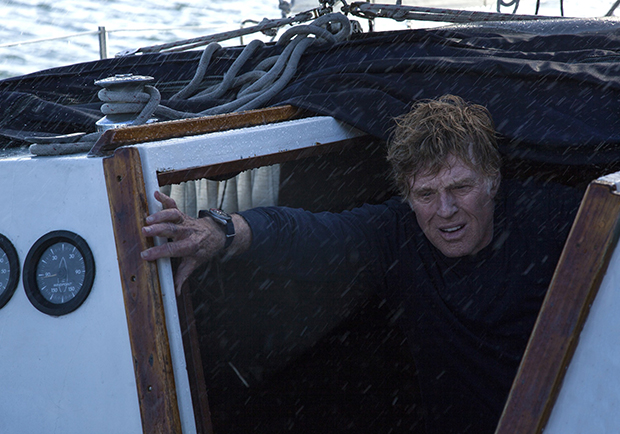In Ernest Hemingway's 1952 classic novel The Old Man and the Sea, there is a moment when, in the midst of a mighty struggle with a huge marlin, the title character turns to God.
"I am not religious," he says aloud, alone in his skiff, holding the line, hands bleeding, muscles aching, as he battles the great fish. "But I will say ten Our Fathers and ten Hail Marys that I should catch this fish. And I promise to make a pilgrimage to the Virgin of Cobre if I catch him."
In the newly released All Is Lost, the protagonist—another old man in his own protracted, perilous war against the sea—also has a word with the Lord. Sort of.
At a critical moment when all certainly seems lost, the man, disheartened and desperate, utters one of the only two words he will say in the entire film. Head bowed, he moans, "God." Is it a prayer of despair? A cry for mercy? Or for a miracle?
There's hardly time to ponder these possibilities—mere seconds, at the most—before the man lifts his head, looks to the heavens, and screams one word at the top of his lungs.
"F***!!!!"
And that—"God" and an f-bomb—is all the dialogue in this riveting 107-minute drama, starring Robert Redford, 77, as a man sailing solo on the Indian Ocean when his boat runs into one problem after another.
 Daniel Daza / Roadside Attractions
Daniel Daza / Roadside AttractionsThe film begins with Our Man (which is how Redford's character is identified in the credits) asleep below deck of the Virginia Jean, his 39-foot sailing yacht. He is awakened by water rushing into the cabin; he has crashed into a large shipping container floating in the sea, leaving a gaping hole in the side of his boat.
We quickly learn that Our Man is a seasoned skipper who knows what he's doing, with a state-of-the-art boat that's rigged with everything he needs. His many skills are immediately evident as he hangs over the side of the boat to patch the hole with fiberglass—a painstaking, multi-step process—but the problems keep coming, well, in waves.
When incoming water shorts out everything and literally leaves him without power or a radio, Our Man, despite his competence and confidence on the high seas, senses the danger. And when one of the most wicked onscreen storms you've ever seen overtakes the Virginia Jean, the film's title feels prophetic.
Redford, still ruggedly handsome, could easily pass for a man in his early 60s. He's so fit that he did most of the stunts himself, including a harrowing scene where he climbs to the top of a 65-foot mast and several where he's dragged along underwater.
Such exploits are impressive, but what's most compelling here is his acting—without saying much of anything. Two words. Simply watching his weathered, wizened face, his expressions, his manner, his movements is captivating. We watch him patch the hole, eat a can a soup, drink a glass of bourbon, cook some vittles, tie some ropes, stand in the rain.
If nothing else, All Is Lost is a study in watching a man simply think. You can tell that Our Man is working things out, seeking solutions, considering his next move. But he's also contemplating his dire circumstances—and his possible demise.
Many reviews are comparing All Is Lost to The Old Man and the Sea, and there's some merit to that. But Hemingway's story—both the book and the 1958 film starring Spencer Tracy—is driven by dialogue, inner and outer, so we always know what the Old Man is thinking. He frequently speaks aloud, and when he doesn't, Hemingway shares the man's thoughts with the reader. (In the film, Tracy narrates his thoughts in voiceover.)
In All Is Lost, it's just the old man and the sea, and we've pretty much got to figure out what he's thinking for ourselves. But Redford makes that exercise gratifying, in one scene after another. In one particularly poignant moment, Our Man stands chest deep in water in his cabin, and he looks into the mirror. Pondering his fate? Looking into the face of inevitable death? No. He contemplates his reflection and then . . . begins to shave. The captain preparing to go down with his ship? Perhaps. But he wants to look good doing it.
It's one of those moments where, as a viewer, you can only watch and appreciate. You forget Redford is acting, and you just see a man fighting for his life. But then, as you exit the theater, you remember that Redford has never won an Oscar for acting (he won Best Director for 1981's Ordinary People). And you think, This is his time. One of the most respected men in the business, Redford did win an honorary Oscar in 2002, essentially a lifetime achievement award. But in All Is Lost, this is the achievement of a lifetime.
It's also worth noting the work of writer-director J.C. Chandor (Margin Call), who brilliantly pulls off several feats with All Is Lost: the entire movie takes place on water; there's only one character; there's almost zero dialogue. (Movie scripts are often 120 pages or more; this one was 30.)
 Richard Foreman / Roadside Attractions
Richard Foreman / Roadside AttractionsWell, to be honest: while Redford only utters two words on screen, it's not exactly true that those are all the words he says in the entire film. As the movie opens on a still blank screen, before we see Our Man or his boat, we hear Redford in a very brief voiceover, setting the scene. Here's a portion of that opening monologue:
"I'm sorry," he says. "I know that means little at this point, but I am. I tried, I think you all would agree that I tried. To be true, to be strong, to be kind, to love, to be right. But I wasn't . . . All is lost here . . . except for soul and body . . . that is, what's left of them.
"It's inexcusable, really, I know that now. How it could have taken this long to admit that, I'm not sure. But it did. I know it now, and I'm sorry. I did not want to go, I still don't, I fought till the end, I'm not sure what that is worth, but know that I did. . . .
"I'm sorry."
Who's Our Man thinking about when he says these words? And just what is he sorry for? Is he hinting at a confession? Seeking forgiveness? Reaching for redemption?
Good questions to keep in mind later when finally does utter those two words, in that particular order. Is it a declaration of guilt? ("God, I effed up.") Is it a plea? ("God, I'm effed, out here alone. Help!") Is it anger? ("God, what the eff?") Is it a curse? ("Eff you, God.") And how does it tie into those opening words, particularly "I'm sorry"?
The answers lie somewhere between an old man and a vast, merciless sea.
Caveat Spectator
All Is Lost is rated PG-13 for brief strong language—one f-bomb. The main character is in frequent peril, indeed, mortal danger. One storm is particularly terrifying, as his boat is bashed about by the wind and waves.
Mark Moring, a former film and music editor at CT, is a writer at Grizzard Communications in Atlanta.











